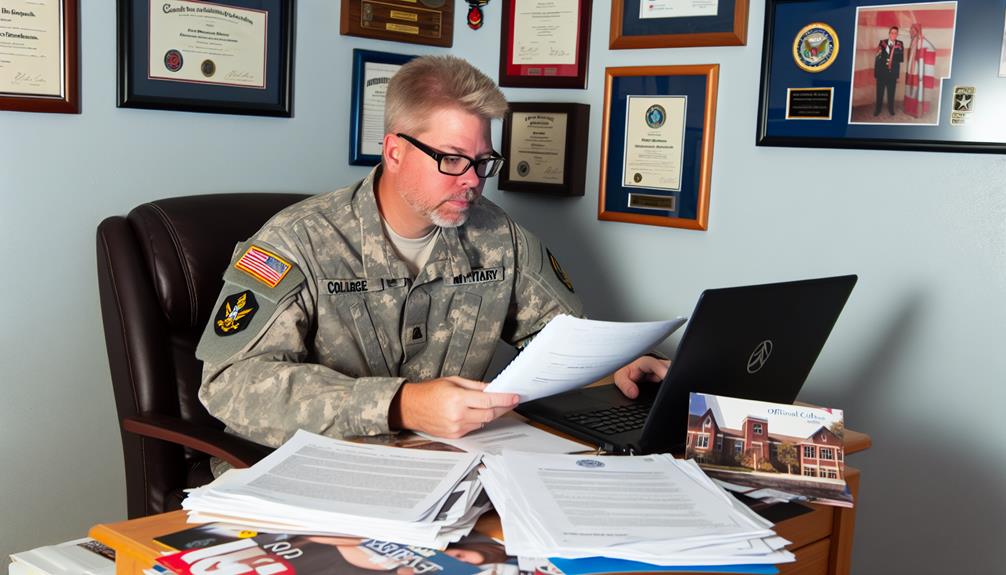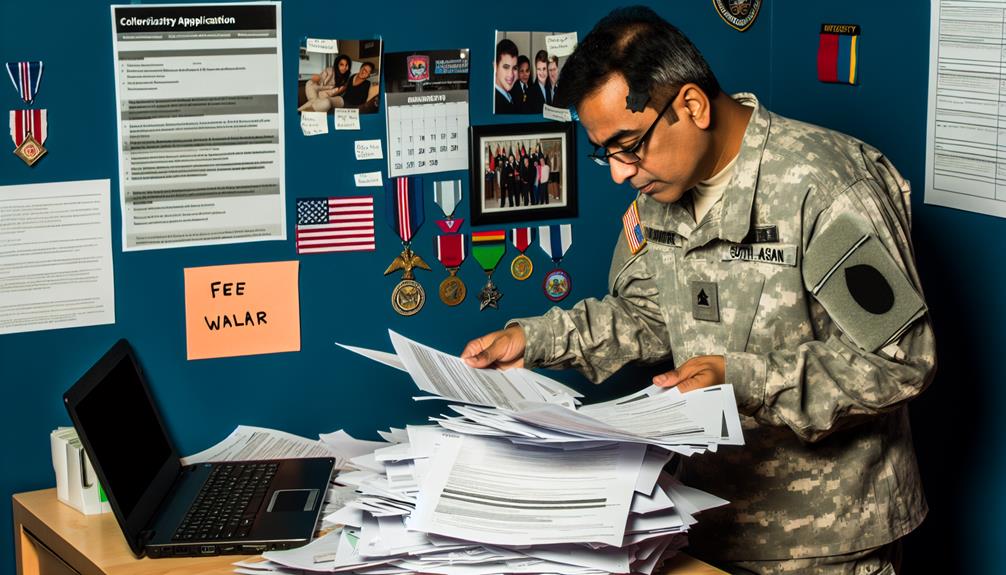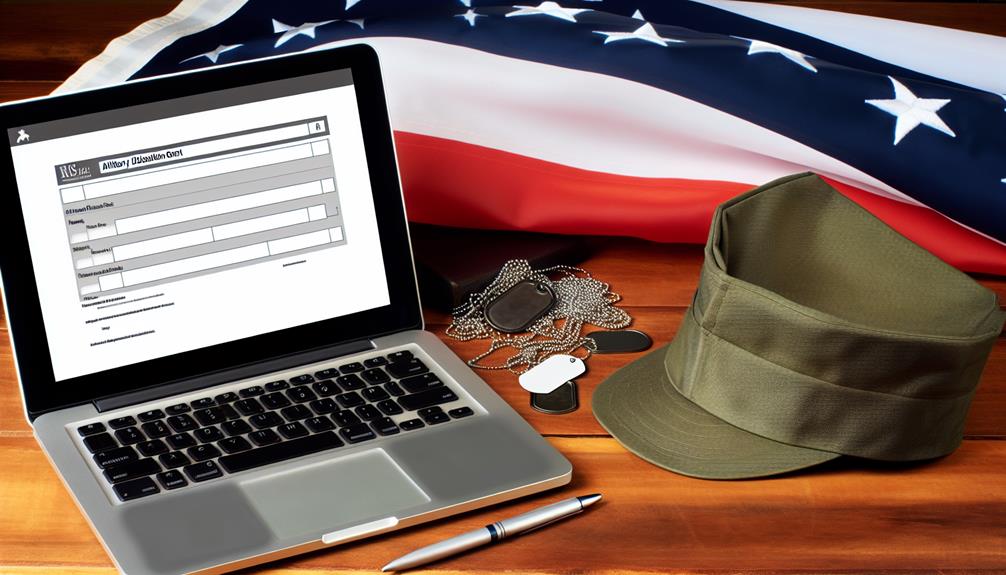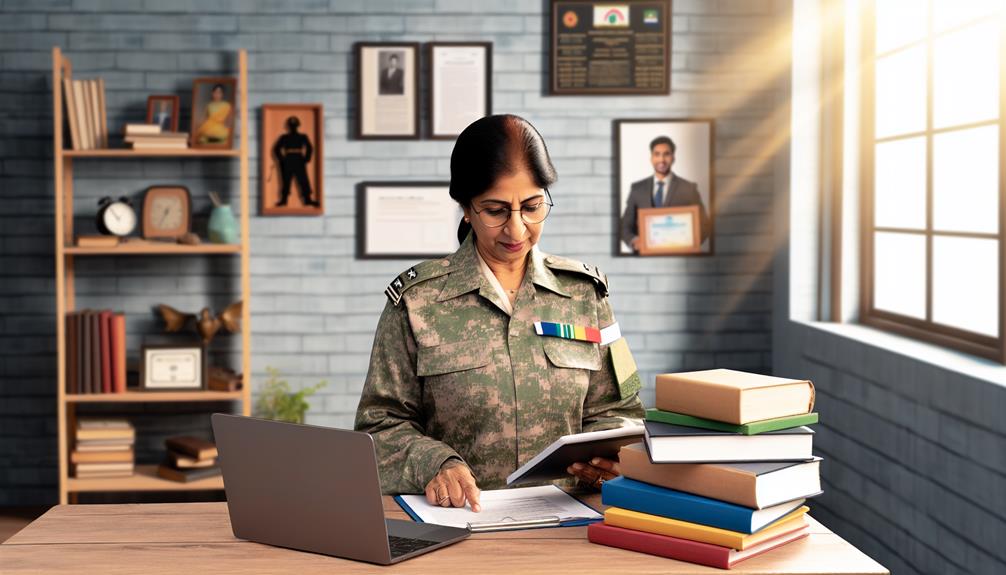As a military veteran, applying for college involves several steps. First, identify the admission criteria for your preferred schools and gather necessary documents like military transcripts and discharge papers. Utilize the GI Bill for funding, ensuring you apply early to avoid delays. Consider colleges that offer veteran support services and are approved for VA benefits. Don't forget to organize your application materials, including standardized test scores and essays reflecting your unique experience. It's also wise to explore fee waiver options for potential financial relief. Keep exploring your options to make the most informed decision on your educational journey.
Key Takeaways
- Verify military status and eligibility for college admission by submitting required military transcripts and documentation.
- Complete the application process using The Common Application, including the application fee and necessary test scores.
- Gather and submit all required documents such as military transcripts, high school records, and recommendation letters.
- Apply for GI Bill benefits early to ensure funding for education; consult the school's certifying official for assistance.
- Research colleges with veteran support services and ensure they are approved for VA education benefits.
Understanding Admission Criteria
When applying for college as a military veteran, it is vital to understand the admission criteria that pertain to your unique situation. If you're a first-time college student, you'll need to meet freshman admission criteria. This typically involves submitting your ACT or SAT scores along with your high school transcripts. However, if you've completed 15 or more credit hours at previous colleges or universities, you'll be considered a transfer student. In this case, you'll need to provide official transcripts from all institutions attended.
Keep in mind that some majors may have additional admission requirements, so it's important to check the specific criteria for your intended field of study. If you've only earned credit for military training, you may find your options limited to majors without extra admission criteria. Additionally, you'll likely need verification of military status during the college application process. This step guarantees that you meet eligibility requirements and comply with institutional policies. By understanding these admission criteria, you can better navigate your path to higher education as a military veteran.
Steps to Complete Your Application
Completing your college application as a military veteran involves several key steps to confirm you meet all requirements. Start by filling out the University of Houston application through The Common Application. Don't forget to submit the nonrefundable application fee of $75 for domestic students or $90 for international students.
Next, make sure you provide your military transcripts, as all military students need these for admission consideration. They should be sent as electronic PDFs directly from your service. If you're a transfer applicant, include official transcripts from all colleges or universities you've attended previously.
For freshman applicants, you'll need to send your ACT or SAT scores directly from the testing agencies. Use the ACT code 4236 and the SAT code 6870. Also, remember to verify your military status during the admission process; this is vital to confirm eligibility for your education benefits like the GI Bill.
Lastly, consider reaching out to veterans resource centers for guidance throughout your application process. They can help you navigate any challenges you face and provide valuable support as you pursue your educational goals.
Submitting Military Transcripts

After you've completed your application, the next significant step is submitting your military transcripts. This includes all relevant documents such as JST, Air Force College, and ACE transcripts, which are essential for your admission process. Make sure you send these transcripts as electronic PDFs directly from your military service to guarantee timely processing.
To obtain your transcripts, you can request Army, Marine Corps, Navy, and Coast Guard records through the JST site. For Air Force transcripts, visit the Air University or the CCAF Online Transcript System. It's important to have these documents ready because verification of military status might be required during the admission process, making the inclusion of your military transcripts crucial.
Don't forget to reach out to University of Houston Veteran Services for specific guidance on how to submit your military transcripts correctly. They can provide valuable information that aligns with their requirements. By following these steps, you'll make sure that your application is complete and that you meet all necessary criteria for a successful admission. Submit your transcripts promptly to avoid any delays in your application process.
Credit for Military Experience
Credit for military experience can greatly enhance your college application and academic journey. By leveraging your service, you can earn college credit that may fulfill elective requirements, making your shift smoother. The Texas Education Code allows veterans to receive up to 12 hours of undergraduate credit for military service. To qualify, you must have graduated from an accredited high school and provide proof of honorable discharge after at least two years of service.
Here's a quick overview of the credit process:
| Requirement | Details | Additional Notes |
|---|---|---|
| DD-214 Form | Submit the DD-214 member 4 form to Admissions | Essential for military credit review |
| Military Transcripts | Provide JST, ACE, or CCAF as electronic PDFs | Required for proper evaluation |
| Petition for Additional Credit | Submit a petition for more than 12 hours | Requires approval from the dean |
Utilizing your military experience can maximize your Veterans benefits, so don't miss out on transferring credit that recognizes your service.
Fee Waiver Options

Maneuvering through the college application process can be intimidating, especially when it comes to financial considerations. As a military student, you might qualify for a fee waiver under specific admissions policies, which can greatly ease your financial burden. If you're a Freshman applicant, using the NACAC fee waiver form is one way to potentially waive that application fee, which typically ranges from $75 for domestic students to $90 for international students.
However, it's essential to recognize that transfer military students generally aren't eligible for a fee waiver when applying to college. If you're an active duty student who's unable to attend classes due to deployment, you may qualify for a fee waiver upon reapplication, so don't overlook this option.
To guarantee you understand your eligibility and the steps to take, it's highly recommended that you contact the Office of Admission directly. They can provide detailed information and guidance on the fee waiver process, as well as how it fits into your overall financial aid strategy. Don't hesitate to reach out and make the most of the resources available to you!
Accessing Veteran Resources
Accessing veteran resources is essential for guaranteeing you receive the support you need as you move to college life. As a military veteran, you have unique opportunities to maximize your education funding. Start by visiting the Office of the University Registrar to get your GI Bill Certification, which will help cover your educational costs, including tuition and fees.
If you're a Texas veteran, don't forget about the Hazlewood Act, which offers additional benefits like tuition exemptions at public colleges and universities. To further enhance your financial strategy, consider applying for FAFSA, which can provide grants and scholarships that supplement your GI Bill benefits.
Don't overlook the resources available on campus. Veterans Services often offer counseling, tutoring, and application assistance to help you shift smoothly into academic life. If you're still active duty, look into the Department of Defense Tuition Assistance (TA) program, which can also cover tuition for college courses taken while serving. By tapping into these veteran resources, you can guarantee you're well-prepared for your educational journey and make the most of your benefits.
Applying for GI Bill Benefits

Applying for GI Bill benefits is a crucial step in funding your education as a military veteran. To start, you need to determine your eligibility, which depends on your service duration and discharge status. For those with service ending before January 1, 2013, the Post-9/11 GI Bill allows you to use benefits for up to 15 years. After that date, you have unlimited access to these benefits.
It's recommended to apply early, as the process can take up to six months. You can submit your application online through the Department of Veterans Affairs (VA) website, or ask your school's certifying official for assistance. To make the process smoother, gather essential documents, including your military discharge papers and a thorough education history.
Additionally, take advantage of the GI Bill Comparison Tool available on the VA website. This tool helps you assess the benefits and costs associated with different colleges and programs, ensuring you're well-informed as you move forward in applying to college. By being proactive and organized, you can maximize your GI Bill benefits and pave the way for a successful academic journey.
Selecting the Right College
Once you've secured your GI Bill benefits, the next step is selecting the right college for your educational goals. Start by researching colleges and universities that have dedicated veteran support services. These resources can notably enhance your shift to academic life. Look for institutions with strong veteran graduation rates and a robust alumni network, as these factors often indicate a supportive environment.
Make sure the colleges you're considering are approved for VA education benefits, ensuring you can effectively utilize your GI Bill benefits. Additionally, explore schools that participate in the Yellow Ribbon Program, which can provide extra financial assistance beyond your GI Bill benefits, helping to cover tuition costs.
Evaluate the flexibility of course offerings as well. Online classes and evening courses can accommodate your unique schedule and responsibilities, especially if you're balancing work or family commitments. Finally, consider credit transfer options if you've previously earned credits. This can save you time and money while advancing your education. Selecting the right college is essential, so take your time to find one that meets your needs and supports your journey as a veteran.
Organizing Application Materials

When preparing to apply for college, organizing your application materials is crucial to guarantee a smooth process. Start by gathering all the necessary documentation, including your military discharge papers and official military transcripts. Don't forget to include your high school or any previous college transcripts to guarantee a complete application.
If standardized test scores like the ACT or SAT are required, have them sent directly from the testing agencies to the college. Next, focus on crafting a compelling application essay that highlights your unique military experience and explains how it shapes your academic goals. This personal statement is your chance to stand out.
Additionally, prepare recommendation letters from individuals who can speak to your character and skills. It's beneficial if these referees are familiar with your military service or academic potential. Finally, confirm all application fees are ready. Remember, as a military student, you might be eligible for fee waivers, so check with the admissions office for details. Taking these steps will help you present a well-organized application that reflects your strengths and experiences.
Financial Planning for Education
After organizing your application materials, it's time to focus on financial planning for your education. Begin by exploring the GI Bill, which can cover tuition and fees for up to 36 months at in-state public colleges. If you're considering a private institution, check out the Yellow Ribbon Program for additional assistance.
Next, create an extensive budget that includes tuition, fees, living expenses, and other costs related to college. Don't forget to look for scholarships specifically for veterans; these can greatly supplement your funding.
Familiarize yourself with the FAFSA application process to determine your eligibility for federal financial aid. Submitting it on time can maximize your funding opportunities.
If your GI Bill benefits don't cover the full cost, consider private student loans as an option. Just be mindful of interest rates and repayment terms when you do. Finally, stay informed about repayment options for any loans you take out. You might benefit from interest rate discounts by enrolling in auto debit for repayments, making your financial planning smoother in the long run.
Frequently Asked Questions
Is It Easier to Get Into College as a Veteran?
Yes, it's often easier to get into college as a veteran. Many colleges value your unique experiences and perspectives, which can enhance campus diversity. You might benefit from streamlined admissions processes, reduced application requirements, and potential waivers for standardized tests. Additionally, some institutions offer academic credit for your military training, helping you finish your degree faster. With dedicated support services available, you'll find resources tailored to your needs throughout the application process.
How Many Years Do I Have to Be in the Military to Get Free College?
To qualify for free college through the Post-9/11 GI Bill, you'll need at least 90 days of active duty service after September 10, 2001. If you're looking at the Montgomery GI Bill, you'll have to serve a minimum of two years. For maximum benefits, serving 36 months or more could get you up to 100% of tuition covered. Remember, you can use these benefits for up to 15 years after your service ends.
Does the US Government Pay for Veterans to Go to College?
Yes, the U.S. government does pay for veterans to attend college. You can access several programs like the Post-9/11 GI Bill, which covers tuition and fees for eligible veterans. You might also benefit from the Forever GI Bill, offering up to 36 months of paid college credit. If you're considering private or out-of-state schools, the Yellow Ribbon Program can help with additional costs. Just remember to apply through the U.S. Department of Veterans Affairs.
Do Veterans Pay College Application Fee?
You might have to pay a college application fee, which typically ranges from $75 to $90, depending on whether you're applying domestically or internationally. However, as a military veteran, you could qualify for a fee waiver under certain admissions policies. It's best to check with the college's Office of Admission directly to understand your eligibility and any necessary forms you'll need to fill out for a potential waiver.
